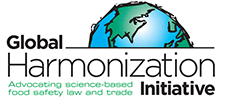Venezuela
Ambassador
Maria S. Tapia, PhD
Professor, Universidad Central de Venezuela
Facultad de Ciencias
Foundation 5aldia Venezuela (5aday)
Ambassador’s Report
A Venezuelan ambassador cannot be relieved from and arduous task: report on that area where food security and food safety overlap. Deep economic recession, hyperinflation and the loss of purchasing power, together with the dismantlement of the domestic food production system and the dependency on food imports, have created a vicious circle that has affected the right to safe and nutritious food for most Venezuelans. For a decade of high oil prices (2004-2014), there was an extreme dependency on food imports. In 2013, 65% of the necessary caloric intake was covered through food imports.
This avalanche of food imports -facilitated by a preferential exchange rate- produced a laxity in the procedures and compliances with many regulations, coupled with a high probability of corruption. With the fall in oil prices and the reduction of the oil extractive capacity of the country, food imports drastically dropped, but domestic food production to fill the gap has not been reactivated. As a result, food availability has been at critical levels as food imports had been reduced by 76% between 2013 and 2017, and domestic food production had dropped from covering 75%of the food demand in 2013 to only 25% by the end of 2017. Yet, the Government continues to import basic foods to comply with social programs and sell them at regulated prices. Many complains have been documented about their unsuitability to Venezuelan cultural patterns as well as nutritional composition and safety.
The scientific community, NGOs, food industry and other stakeholders need to be alert to report on these cases. Unfortunately, this is not the time for Venezuela to update food safety regulations, full compliance with our old instituted food safety regulations, no matter if outdated, would be enough as long as food safety protections for Venezuelans consumers is achieved. However, it does not relieve us from working to harmonise science-based food safety regulations.

Presentations
Conference: 1st World Congress on Food Safety and Security. GHI, 24-28 March, 2019, Leiden, The Netherlands.
Title: Food Security and Food Safety at stake in Venezuela
Website: https://ghiworldcongress.org
Publications
Title: Food and Nutritional Security in Venezuela. The Agrifood Abduction of a Country: Vision and Commitment
Author: Tapia M.S., Puche, M., Pieters, A., Marrero, JF., et al.
Publication and date: In: Challenges and Opportunities for Food and Nutrition Security in The Americas: The View of The Academies of Sciences. The Inter American Network of Academies of Sciences. The Federal Ministry of Education and Research. German National Academy of Sciences-Leopoldina. Pp 567 – 606. (2017).
PDF download: http://www.ianas.org/docs/books/FN01_Ven.html (PDF) ; http://www.ianas.org/docs/books/Challenges_Opportunities.html (PDF)
